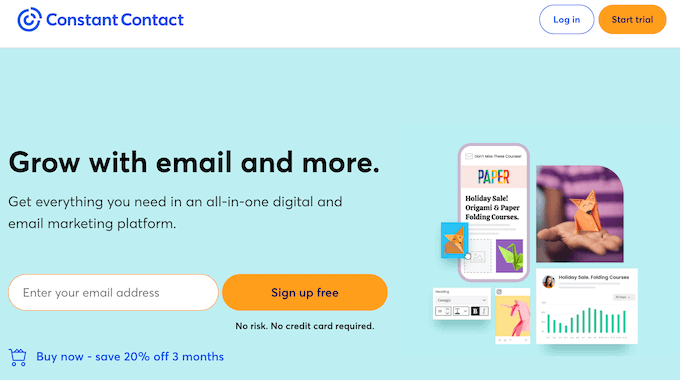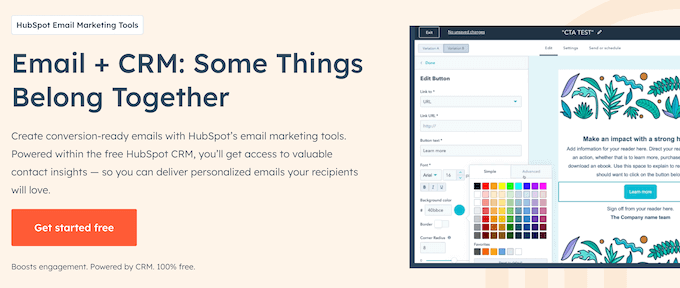
In this article, we will guide you through the top autoresponder programs and evaluate their pros and cons, enabling you to grow your email list with ease.
What Makes an Autoresponder Email Service Essential?
Autoresponder software is a tool used for email marketing that automatically sends pre-written emails to subscribers at predetermined intervals or in response to specific actions or triggers. Autoresponders allow businesses and individuals to easily set up and manage email marketing campaigns, and can be used for a variety of purposes, such as welcoming new subscribers, promoting products or services, nurturing leads, and engaging with customers. Autoresponders can also be used to send personalized messages based on subscriber behavior, such as abandoned cart reminders, order confirmations, and follow-up surveys. Popular autoresponder software includes Mailchimp, AWeber, Constant Contact, and GetResponse.
For instance, if you’re creating a page that will be available shortly, you may invite visitors to indicate their interest by entering their email addresses.

When your website becomes online, you may use an autoresponder to let these people know. This might increase traffic to your website and generate excitement for its debut.
In order to welcome new subscribers or inform current subscribers of new WordPress content, many bloggers utilise an autoresponder sequence.
1. Constant Contact

The world’s top email marketing platform is Constant Contact. Our top recommendation for building autoresponder sequences is it.
Pros
- The generous 60-day free trial for Constant Contact is offered. That allows you two months to start growing your email list and monetizing your WordPress blog.
- You won’t be charged unless and until you consciously decide to continue using Constant Contact because you can sign up for the free trial without providing your credit card information.
- A quick few minutes are needed to create an account. Constant Contact will display some useful resources based on your answers after you click a few options.
- They also offer online training and a library of resources. You can even attend their live, in-person seminars if you live in the United States.
Cons
- There is no free-for-ever plan available from Constant Contact. You’ll have to pay if you want to continue utilising your email list after the 60-day free trial. You can get 20% off using our Constant Contact coupon if you liked the free trial and want to continue.
- After your free trial, you’ll need to subscribe for the Email Plus service to continue using the automated features.
Pricing
The Core package for Constant Contact is $9.99 per month. Nevertheless, you’ll need the Email Plus subscription, which starts at $45 per month, if you want to use the email automation tool.
2. Sendinblue

Sendinblue is a marketing automation software that includes both email and SMS marketing, so you can send SMS text messages to your WordPress users.
They are among the European email autoresponder platforms with the quickest growth.
Pros
- You can keep as many email connections on Sendinblue’s generous free-for-ever plan as you like. The number of emails you can send each day is the only restriction.
- The entirety of Sendinblue’s features, including the marketing automation tools, are accessible on their free plan.
- On the free plan, you have access to email assistance, so you can get in touch with customer service if you run into any issues.
- The marketing automation solution from Sendinblue offers a simple drag-and-drop Workflow Editor. You may do this to develop robust automations without needing to learn any complicated tools or write any code.
- A sign-up form that can be fully customised to add email subscribers to your WordPress blog or website.
Cons
- Sendinblue’s branding appears in every email sent from a free plan, which can make your campaigns appear less professional. The Sendinblue branding is also present in the premium Starter plan, but you can get rid of it by paying a $9 monthly fee.
- Although the marketing automation capabilities are included of the free plan, both the free and Starter plans have a 2000 contact cap on these features. It could be challenging to expand your email list as a result.
- A daily cap of 300 emails is imposed on the free plan. When you first start out, this may seem like a lot, but you can reach this limit quite quickly. Because of this, you shouldn’t pick Sendinblue just because they have a free plan for life.
Pricing
Sendinblue’s free plan is fully free, forever, and there is no cap on the number of contacts you can make, in contrast to some of the other email providers on the list.
More than 300 emails must be sent each day. You will then need to upgrade to one of their paying plans, which begin at $25 per month.
3. Omnisend

Omnisend provides robust SMS, email marketing, and online push notification tools if you’re searching for an autoresponder that functions across several channels.
Omnisend includes pre-made autoresponders for workflows related to eCommerce, including cart abandonment, purchase follow-up, and other workflows.
Pros
- The free plan comes with all of the marketing automation tools.
- Employ as many triggers as you want in your automation workflows.
- Add dynamic content to your autoresponders to personalise them.
- The drag-and-drop Automation Editor allows you to create strong custom workflows.
Automations that are already established that you may utilise to welcome new signups. - Reports on sales and performance enable you to continuously evaluate and improve your autoresponders. For each autoresponder, this contains information on opens, clicks, deliverability rates, and revenue.
- 24/7 email and live chat assistance.
Cons
- You are limited to 500 emails, 60 SMS, and 500 online push alerts per month when using the free plan. Upgrade to the Basic or higher plan, which starts at $16 per month, if you want to send more messages.
- The free plan does not include any SMS credits, therefore you will need to purchase these if you intend to utilise SMS autoresponders.
Pricing
The monthly limit for the free Omnisend plan is 500 emails, 60 SMS, and 500 online push notifications. On your email lists, you can add an infinite number of contacts.
Upgrade to the Basic plan ($16/month) or Pro plan ($59/month) if you’d like to send more emails, SMS messages, or web notifications.
4. HubSpot

One of the top CMRs for small businesses is HubSpot, a well-known marketing automation tool. Also, they provide a free plan that serves as an excellent introduction to HubSpot’s integrated marketing platform.
Pros
- The free plan contains a CRM that creates a contact record for each subscriber. With this data, you may design customised email campaigns with the most pertinent subject lines, links, attachments, and content.
- Many tools in HubSpot’s free plan can enhance your email marketing. A form builder, live chat, ad management, and other features are included.
- You may either create your emails fully from scratch or choose from a variety of goal-based templates provided by HubSpot.
- Use the email analytics tool from HubSpot to analyse your campaigns.
- integrates with Uncanny Automator, one of the top small business marketing automation platforms. To automatically add visitors, clients, and event attendees to your HubSpot mailing lists, utilise Uncanny Automator.
Cons
- The HubSpot branding cannot be removed on the free plan, which may make your company appear less professional.
- You are only allowed 2,000 emails and 1,000,000 contacts each month under the free plan.
- Only HubSpot’s higher-tiered paid services include with advanced capabilities like A/B split testing and email segmentation. To make the most of your email list as your business expands, you might need to upgrade to a paid plan.
Pricing
The generous 1,000,000 contacts and 2,000 emails per month allowed by HubSpot’s free plan. Also, it includes every free feature offered by HubSpot, such as the CRM, forms, landing sites, live chat, and more.
Paid subscriptions begin at $45 per month when paid yearly.
5. FunnelKit Automations

The greatest marketing automation platform for WooCommerce stores is FunnelKit Automations, formerly known as Autonami.
With the help of this free plugin, you can develop automatic emails and SMS campaigns that may be used to distribute automated coupons, nurture leads, and recover abandoned shopping carts.
Pros
- No limit on the amount of contacts you can add, or how many emails you can send.
- Utilize any email service provider, including SendGrid, Mailgun, Postmark, or Sendinblue.
- Using the drag-and-drop editor, create automations from scratch or quickly import any of FunnelKit’s pre-built automations.
- Sending welcome emails to new users will help you onboard and instruct new clients.
- All emails already contain “Unsubscribe text,” so you can be sure that your autoresponders are GDPR compliant.
- Obtain helpful data, like as email open and click-through rates, from inside the FunnelKit dashboard.
- You may effortlessly import your contacts with a CSV file if you’ve previously utilised an email marketing platform or CRM.
Cons
- You can only access a few pre-built automations with the free plugin. By upgrading to FunnelKit Automations pro, you may access over 20 additional automations.
- To enable consumer tracking in WooCommerce and view advanced analytics, you must upgrade to FunnelKit Automations Pro.
- The pro version includes capabilities similar to CRM, such as thorough contact profiles that display each person’s most recent engagement, overall spending, date of most recent order, and more.
- The pro edition is the only one that offers several of the more sophisticated analytical and reporting functions. This enables you to view your top-performing automations, most-read emails, overall order totals, and overall income.
Pricing
You have all the tools you need to build effective autoresponders for your WooCommerce store with the free FunnelKit Automations plugin. Nevertheless, you’ll need to subscribe to the FunnelKit Marketing Automations Professional or higher plan, which starts at $219 per year, if you want to access more automation capabilities.